外研版(2019)必修 第一册Unit 3 Family matters Using language课件(共48张PPT)
文档属性
| 名称 | 外研版(2019)必修 第一册Unit 3 Family matters Using language课件(共48张PPT) |  | |
| 格式 | pptx | ||
| 文件大小 | 2.3MB | ||
| 资源类型 | 教案 | ||
| 版本资源 | 外研版(2019) | ||
| 科目 | 英语 | ||
| 更新时间 | 2023-11-02 17:01:59 | ||
图片预览

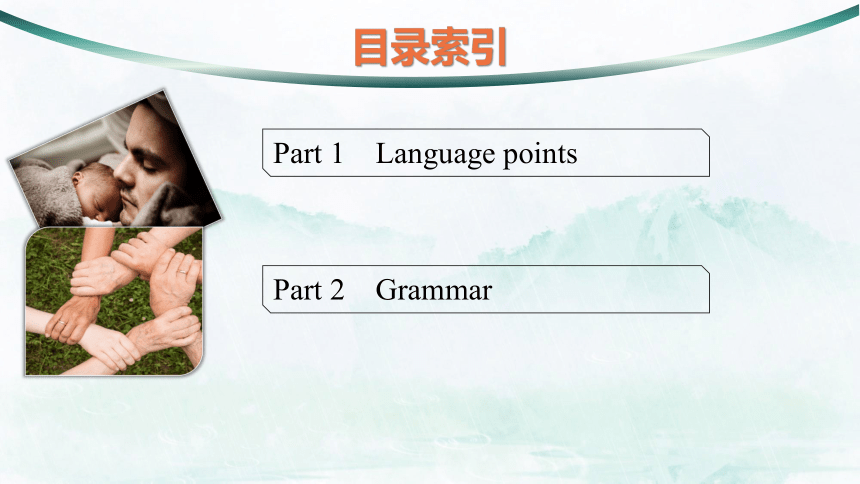
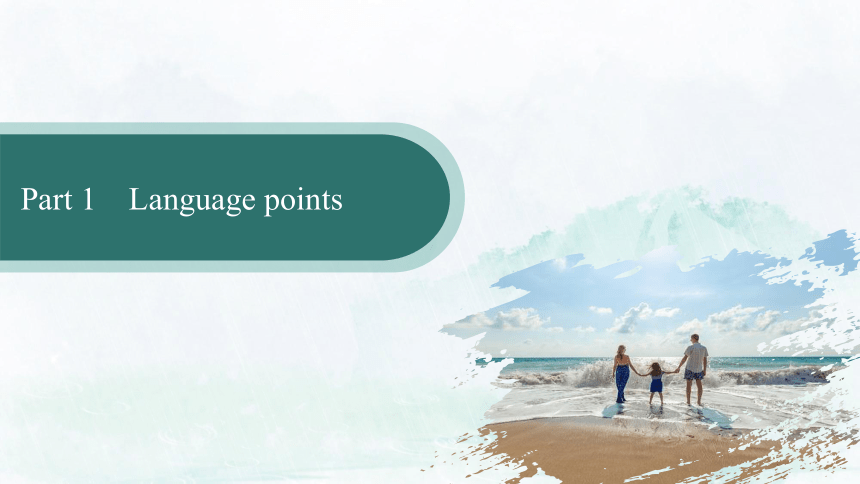
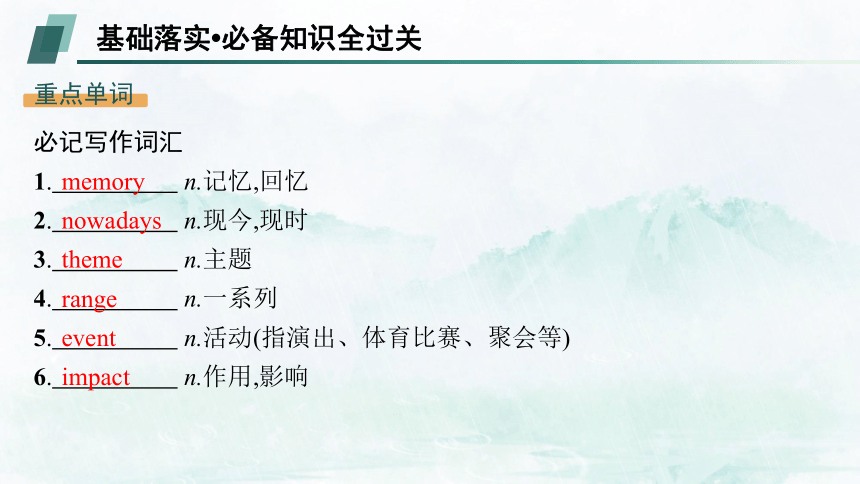
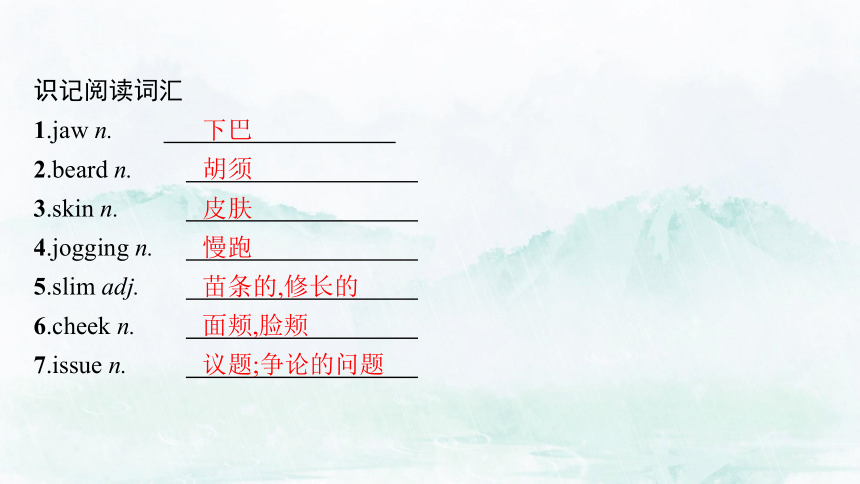
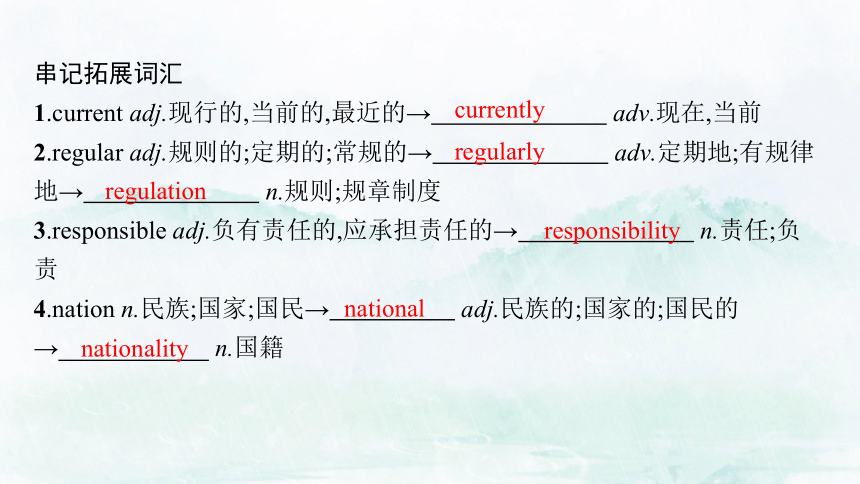
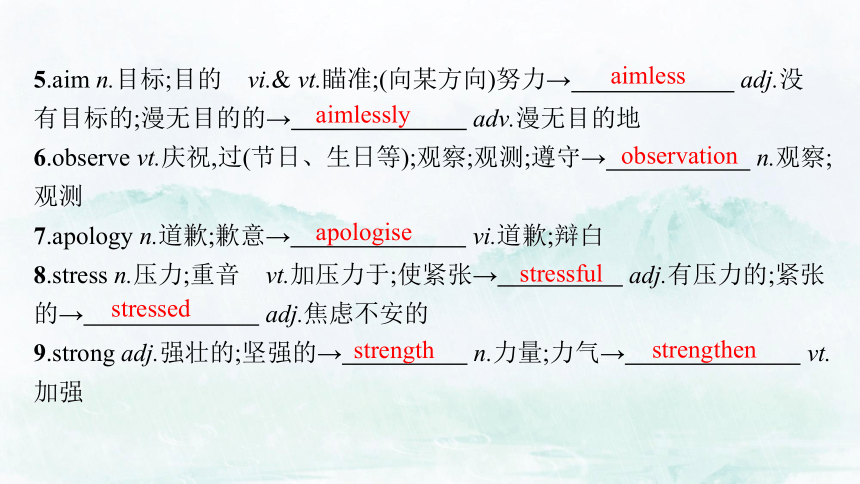
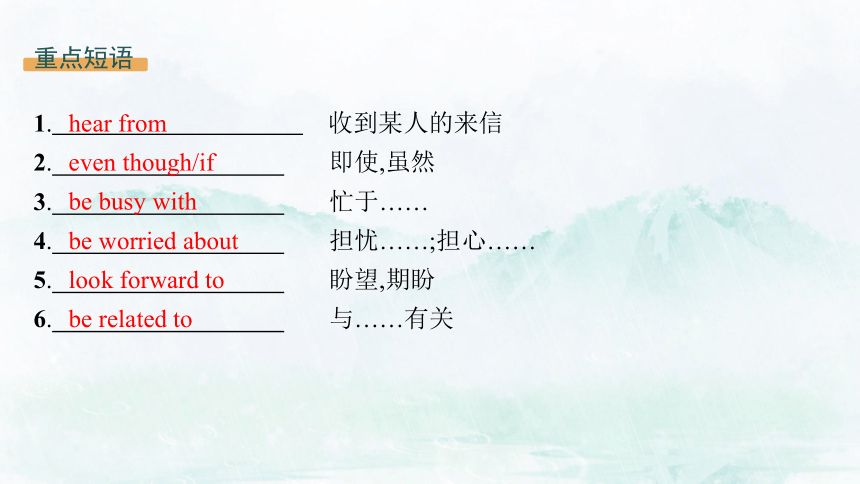
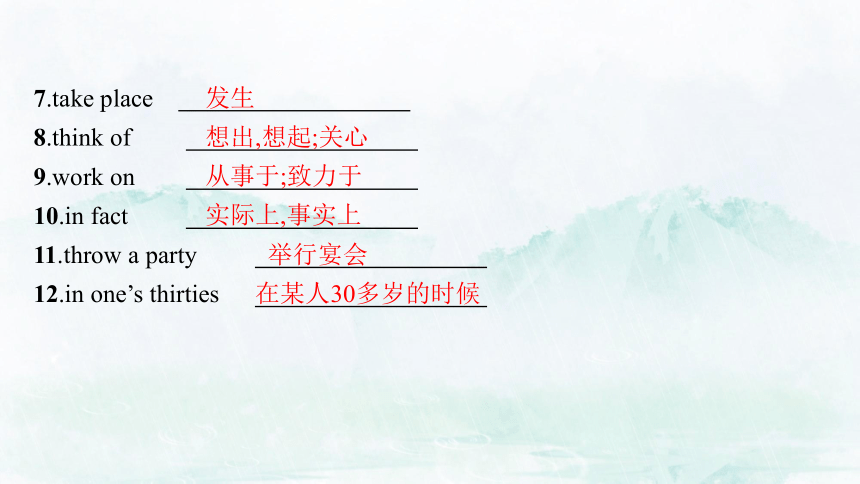

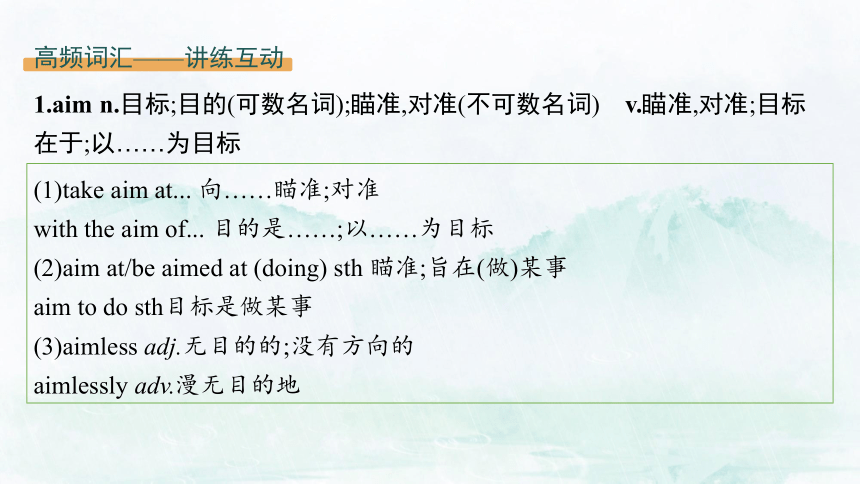
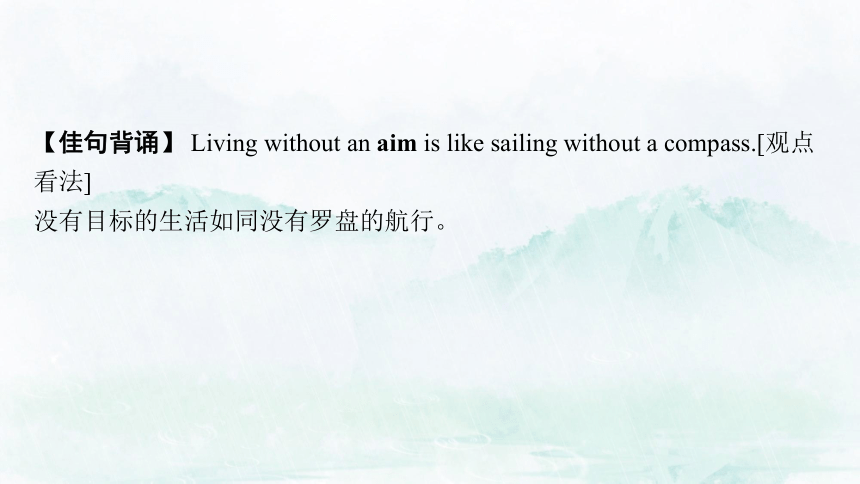
文档简介
(共48张PPT)
Unit 3 Family matters
Section B Using language
Part 1 Language points
Part 2 Grammar
目录索引
Part 1 Language points
基础落实 必备知识全过关
重点单词
必记写作词汇
1. n.记忆,回忆
2. n.现今,现时
3. n.主题
4. n.一系列
5. n.活动(指演出、体育比赛、聚会等)
6. n.作用,影响
memory
nowadays
theme
range
event
impact
识记阅读词汇
1.jaw n.
2.beard n.
3.skin n.
4.jogging n.
5.slim adj.
6.cheek n.
7.issue n.
下巴
胡须
皮肤
慢跑
苗条的,修长的
面颊,脸颊
议题;争论的问题
串记拓展词汇
1.current adj.现行的,当前的,最近的→ adv.现在,当前
2.regular adj.规则的;定期的;常规的→ adv.定期地;有规律地→ n.规则;规章制度
3.responsible adj.负有责任的,应承担责任的→ n.责任;负责
4.nation n.民族;国家;国民→ adj.民族的;国家的;国民的
→ n.国籍
currently
regularly
regulation
responsibility
national
nationality
5.aim n.目标;目的 vi.& vt.瞄准;(向某方向)努力→ adj.没有目标的;漫无目的的→ adv.漫无目的地
6.observe vt.庆祝,过(节日、生日等);观察;观测;遵守→ n.观察;观测
7.apology n.道歉;歉意→ vi.道歉;辩白
8.stress n.压力;重音 vt.加压力于;使紧张→ adj.有压力的;紧张的→ adj.焦虑不安的
9.strong adj.强壮的;坚强的→ n.力量;力气→ vt.加强
aimless
aimlessly
observation
apologise
stressful
stressed
strength
strengthen
重点短语
1. 收到某人的来信
2. 即使,虽然
3. 忙于……
4. 担忧……;担心……
5. 盼望,期盼
6. 与……有关
hear from
even though/if
be busy with
be worried about
look forward to
be related to
7.take place
8.think of
9.work on
10.in fact
11.throw a party
12.in one’s thirties
发生
想出,想起;关心
从事于;致力于
实际上,事实上
举行宴会
在某人30多岁的时候
要点探究 能力素养全提升
基础词汇——语境记忆
look forward to 期望;期待;盼望
【佳句背诵】Then finally came the moment Sam had been looking forward to—the day he went back to hometown.[情景描写]
后来,山姆一直期待回家乡的那一天终于来了。
高频词汇——讲练互动
1.aim n.目标;目的(可数名词);瞄准,对准(不可数名词) v.瞄准,对准;目标在于;以……为目标
(1)take aim at... 向……瞄准;对准
with the aim of... 目的是……;以……为目标
(2)aim at/be aimed at (doing) sth 瞄准;旨在(做)某事
aim to do sth目标是做某事
(3)aimless adj.无目的的;没有方向的
aimlessly adv.漫无目的地
【佳句背诵】 Living without an aim is like sailing without a compass.[观点看法]
没有目标的生活如同没有罗盘的航行。
【即学即练】单句语法填空/一句多译
①(2021·新高考全国Ⅰ卷)Our aim was (see) if we could live,in some way,like real Parisians.
②(2021·全国乙卷)Activities there range from whale watching to hiking(远足) and accommodations aim (have) a low impact on the natural environment.
③The event is due to be held in ten days’ time the aim of encouraging young people to love jogging.
to see
to have
with
这项活动的目的旨在提高学生的听说能力。
→④This activity the students’ ability of listening and speaking.(be aimed at)
→⑤This activity the students’ ability of listening and speaking.(aim to do...)
→⑥This activity the students’ ability of listening and speaking.(aim at)
is aimed at improving
aims to improve
aims at improving
2.observe v.观察;注意到;遵守(法律、习俗等);庆祝(节日等);评论,评述
(1)observe sb doing sth 观察/注意到某人在做某事(强调动作正在进行)
observe sb do sth 观察/注意到某人做过某事(强调动作的整个过程)
observe sb/sth done 观察/注意到某人或某物被……
observe that/wh- clause 观察到……;注意到……
(2)observation n.观察;注意;监视
【佳句背诵】 In my 20 days in Xi’an,I got the opportunity to observe a range of Chinese cultural activities closely,which left an unforgettable impression on me.[人物介绍]
在西安的20天里,我有机会近距离观察了一系列中国文化活动,这给我留下了难忘的印象。
【即学即练】单句语法填空/句式升级
①The guard observed a young man (steal) from the office,so he tried to approach him quietly.
②Mary is observed (take) exercise regularly every day to keep slim.
③We observed a monument (set) up in memory of the dead in the Anti-Japanese War.
④On the top of Mount Tai,people excitedly observed that the sun was rising from the sea of clouds.
→On the top of Mount Tai,people excitedly __________________________
.(用“observe+宾语+宾语补足语”)
stealing
to take
set
observed the sun rising from
the sea of clouds
【名师点津】
observe作“观察;注意”讲时,可用省去to的动词不定式或动词-ing形式作宾语补足语;但如果用于被动语态,省去的动词不定式符号to要还原。类似的词还有:see,watch,notice,hear,make等。
3.range n.山脉;幅度;范围;种类 v.排列;(在一定范围内)变化,变动
(1)in/within range(of sth)在(……)范围内
beyond/out of range(of sth)在(……)范围外
a wide range of...范围广泛的;各种各样的
(2)range from...to...在……范围内变动
range between...and...在……和……范围内变动
【佳句背诵】 Moreover,with the stadium set up,a wide range of sports events are able to be held.[地点介绍]
此外,随着体育场的建成,可以举办各种各样的体育赛事。
【即学即练】单句语法填空/句式升级
①The fish stayed 50 yards offshore,well range and were hard to catch.
②The national park has a large collection of wildlife, (range) from butterflies to elephants.
③When driving on the highway,the driver must control his or her speed within range 60 km/h and 120 km/h.
beyond
ranging
of
(2021·新高考全国Ⅰ卷)Youth covers many articles with various themes,and they range from hot news to inspiring stories.
→④Youth covers many articles with various themes, which .(用定语从句)
→⑤Youth covers many articles with various themes,
.(用动词-ing形式)
range from hot news to inspiring stories
ranging from hot news to inspiring stories
4.apologise v.道歉
(1)apologise to sb for (doing) sth 因(做)某事向某人道歉
apologise for oneself 为自己辩解或辩护
(2)apology n.道歉;辩白
make an apology to sb for sth 因某事向某人道歉
accept/refuse one’s apology 接受/拒绝某人的道歉
owe sb an apology 应向某人道歉
【佳句背诵】 To my surprise,she smiled at me and apologised to me for ignoring my loneliness.[人物描写]
令我惊讶的是,她对我微笑,并为忽视我的孤独而道歉。
【即学即练】单句语法填空/一句多译
①(2021·全国甲卷)“I remember walking down the long hall and opening the door to my room to find an entire flock of seagulls,” Burchill said in a recent letter of (apologise) to the 4-star hotel.
②Victor apologised his not being able to inform me of the change in the plan.
③It must be stressed that you must apologise her having kept her waiting.
apology
for
to
for
如果你没有对自己的行为负责,你应该向你的校长道歉。
→④If you weren’t responsible for your actions,you should .(apologise)
→⑤If you weren’t responsible for your actions,you should .(apology)
apologise to your headteacher
make an apology to your headteacher
重点句式——多维剖析
keep+宾语+宾语补足语
【教材原句】...and jogging has kept her slim and fit.
……慢跑使她保持苗条和健康。
keep意为“使……保持在某种状态”时,后面常带“宾语+宾语补足语”,从而构成“keep复合结构”,常用结构有:
(1)keep+n./pron.+动词-ing形式
(2)keep+n./pron.+过去分词
(3)keep+n./pron.+形容词/副词/名词/介词短语
【佳句背诵】 Speaking of table manners,keep your voice low and pleasant during the meal.[礼仪文化]
说到餐桌礼仪,请在用餐时保持低的、令人愉快的声音。
【即学即练】单句语法填空/句式升级
①Bit by bit,the policeman approached the thief,keeping his eyes firmly
(fix) on him.
②Next,keep the conversation (go) by asking questions to show interest.
③It can prevent us from getting short-sighted and it can keep us physically
(health).
④If something special happens,please inform us as soon as possible.
→If something special happens,please as soon as possible.(用“keep+宾语+宾语补足语”)
fixed
going
healthy
keep us informed
【名师点津】
在“keep+宾语+宾语补足语”结构中,动词-ing形式与宾语之间为主动关系,过去分词与宾语之间为被动关系。
Part 2 Grammar
语法冲关 语言规则全理清
情景导入
复习时态
①Stephen is very excited today,because his parents will be back from China.②This is the first time that he has been away from his family for such a long time.③They phoned him yesterday and said,“We are leaving for the airport at four o’clock,because the plane takes off at six.④Are you coming to the airport to meet us ” “Of course,” he said,“if it doesn’t rain tomorrow,I will arrive at the airport in advance”.⑤Now he as well as his grandpa is going to meet his parents at the airport.⑥They are about to lock the door,and suddenly there’s a knock on the door.⑦Stephen’s parents have reached home.⑧It is the most surprising day that Stephen has experienced in his life.
【语法感悟】
句①中谓语will be是 ,表示对将来的客观预测;
句②中谓语has been是 ,用于句型:This is the first time that...;
句③中谓语phoned和said是 ,表示过去某个时间发生的动作;谓语are leaving是现在进行时,表示按计划或安排将要发生的动作;谓语takes off是一般现在时,表示按照时间表要发生的动作;
句④中谓语doesn’t rain是 ,用在if引导的条件状语从句中表示将来的动作;
句⑤中谓语is going to meet是一般将来时,表示将来的计划或安排;
一般将来时
现在完成时
一般过去时
一般现在时
句⑥中谓语are about to lock是一般将来时,表示马上就要发生的动作;
句⑦中谓语have reached是现在完成时,表示过去发生或已经完成的动作对现在造成的影响或结果;
句⑧中谓语has experienced是现在完成时,用于句型:It is the+形容词最高级+名词+that...。
语法精讲
1.一般现在时
(1)表示主语目前的性格、特征、状态或能力等。
They always care for each other and help each other.
他们总是互相关心、互相帮助。
(2)表示现阶段的习惯性、经常性发生的动作或存在的状态,常与表示频度的时间状语连用,如always,often,usually,sometimes,never,frequently,on Sunday,every day/week/month/year,once/twice a week等。
He does his homework before dinner every evening.
他每天晚上晚饭前做作业。
(3)表示客观事实、真理、格言或者警句等。
Time and tide wait for no man.
岁月不等人。
(4)表示按照时间表、计划安排好的或者规定的行为,只限于go,come,leave,start,stop,arrive 等表示动作趋向性或位置移动意义的动词。
The train for Hankou leaves at 8:00 in the morning.
开往汉口的列车于早上8点发车。
(5)在when,before,until/till,as soon as,the moment,once等引导的时间状语从句或if,unless等引导的条件状语从句,或whatever,whoever,whichever,whenever,wherever,however等引导的让步状语从句中,表示将来的动作或状态。
Please ring me up as soon as you arrive in Germany.
请你一到德国就给我打电话。
2.一般过去时
(1)表示过去某个时间发生的动作或存在的状态,常用yesterday,last year,in 2022,the other day 等作时间状语。
I saw him in the street yesterday.
昨天我在街上看见他了。
(2)表示在过去一段时间内,经常性或习惯性的动作,或者描述过去时间内连续发生的动作,常和often,always等频率副词连用。
When I was a teenager,I played table tennis almost every day.
十几岁时,我几乎每天都打乒乓球。
(3)表达“原以为/本来认为/原希望”等时,know,think,expect等动词常用一般过去时。
I didn’t expect to meet you here.
我没料到会在这里碰见你。
(4)在以下句型中,常用一般过去时表示虚拟语气。
It is (high) time (that) you went to bed.
你该睡觉了。
I would rather they came tomorrow.
我宁愿他们明天来。
3.一般将来时
(1)表示不含主观因素、单纯的将来的动作或状态,常用“will/shall+动词原形”,并与表示将来的时间状语连用,如tomorrow,next week等。
We will have a meeting tomorrow.
我们明天要开会。
(2)表示计划、打算要做某事或者有预兆要发生某事,常用“be going to+动词原形”。
We are going to meet outside the school gate.
我们打算在校门口见面。
Look!It is going to rain.
瞧!快下雨了。
(3)表示按计划、约定或按职责、义务必须做的事或即将发生的动作,常用“be to+动词原形”。
He is to visit Japan next year.
明年他将访问日本。
We are to obey these rules when we go into the library.
进入图书馆时我们要遵守这些规定。
(4)be about to do表示即将发生的动作,意为“立刻,马上”,后面不能接时间状语或状语从句。
The eggs are about to hatch.
这些蛋就要孵化了。
4.现在进行时
(1)表示说话时正在发生的动作,常和now,right now,at this moment等时间状语及动词look,listen等连用,这是现在进行时的“暂时性”特征。
We are waiting for you now.
我们现在正等着你呢。
(2)表示现阶段一直在发生的动作,但是说话时不一定在发生,常和these days,this week,at present等时间状语连用,这是现在进行时的“阶段性”特征。
She is learning to swim recently.
她最近正在学游泳。
(3)表示按计划或安排将要发生的动作,只限于go,come,leave,start,stop,arrive等表示动作趋向性或位置移动意义的动词。
We are leaving early tomorrow morning.
我们明天一早就出发。
(4)表示反复出现的或习惯性的动作,往往表达说话者生气、赞扬、同情、不满、好奇等特定的感情,可与always,forever,continually,constantly,usually等副词(短语)连用。
He is always asking the same question.
他总是问同一个问题。
He is always thinking of others,never thinking of himself.
他总是考虑别人,从未考虑过自己。
5.现在完成时
(1)表示过去发生或已经完成的某一动作对现在造成的影响或结果。可以表示最近完成的动作,也可以表示经历或经验。此时的动词常为非延续性动词,如leave,arrive,come,go,return,join,die,buy,borrow等,并与just,recently,yet,before,three times等时间状语连用。
I have just cleaned my clothes.
我刚洗过衣服。
(2)表示过去已经开始,持续到现在(可能还会继续进行下去)的动作或状态,此时的动词常为延续性动词,并和表示一段时间的状语连用,如:常与since,so far,up to now,till/until now,by now,for+时间段,in/over/during the past/last+时间段,these days等连用。
She has taught in the school for ten years.
她在这所学校教书已经10年了。
【名师点津】
非延续性动词如arrive,begin,borrow,buy,come,die,join,leave等,其现在完成时的肯定式不能和表示一段时间的状语连用,此时要用相应的表示延续状态的动词(短语)替换。
He has been away for one minute.
他已经离开一分钟了。
(3)在时间或条件状语从句中,现在完成时可表示将来某时间完成的动作。
I shall post the letter as soon as I have written it.
我一写完信就会寄出的。
(4)经常用于以下句型:
①It is/has been+一段时间+since从句,表示“自从……以来已经……”。
It is/has been about 5 days since she left here.
她离开这里大约有5天了。
②This/It/That is the first/second/third/...time (that)...,表示“这/那是(某人)第一/二/三/……次做某事”,that从句中要用现在完成时。
This is the first time that I have been here.
这是我第一次来这里。
③“It/This is the best/worst/most interesting等+名词(+that)...”中,从句中的谓语用现在完成时。
This is the most interesting book I have ever read.
这是我所读过的最有趣的书了。
【名师点津】
一般过去时与现在完成时的区别
区别 例句
一般过去时只表示过去发生的动作或状态,和现在无关,可以和表示过去的时间状语连用;现在完成时则表示过去发生的动作或存在的状态与现在有联系,强调对现在造成的影响或结果,它不能同表示过去的时间状语连用 ①Mrs Draby lived in Kentucky for seven years.
达比太太过去在肯塔基州住了7年。(现在已不在肯塔基州住)
②Mrs Darby has lived in Kentucky for seven years.
达比太太已经在肯塔基州住了7年。(现在仍住在肯塔基州)
【即学即练】单句语法填空
1.(2021·浙江1月卷)The study found that between 1985 and 2017,average rural BMI increased by 2.1 in women and men.In cities,however,the gain
(be) 1.3 in women and 1.6 in men.
2.(2021·浙江卷)After Lincoln was elected President of the US in 1861,they rented the house and (sell) most of their furniture.
3.The curtains (open),and in a few minutes the action and dialogue will tell you the story.
4.It (mean) we have the chance to obtain information about how the moon is constructed.
was
sold
are about to open
means
5.The unmanned Chang’e-4 probe(探测器)—the name was inspired by an ancient Chinese moon goddess— (touch) down last week in the South Pole-Aitken basin.
6.Hurry up!The train (leave).We must get on as soon as possible.
7.I don’t know whether my sister will come.If she (come),I will let you know.
8.We (go) out for a picnic this weekend.Would you like to attend it
9.This is the first time I (come) to a Chinese restaurant.
10.I feel very terrible.I think I (be) ill.
touched
is leaving
comes
will go
have come
am going to be
本 课 结 束
Unit 3 Family matters
Section B Using language
Part 1 Language points
Part 2 Grammar
目录索引
Part 1 Language points
基础落实 必备知识全过关
重点单词
必记写作词汇
1. n.记忆,回忆
2. n.现今,现时
3. n.主题
4. n.一系列
5. n.活动(指演出、体育比赛、聚会等)
6. n.作用,影响
memory
nowadays
theme
range
event
impact
识记阅读词汇
1.jaw n.
2.beard n.
3.skin n.
4.jogging n.
5.slim adj.
6.cheek n.
7.issue n.
下巴
胡须
皮肤
慢跑
苗条的,修长的
面颊,脸颊
议题;争论的问题
串记拓展词汇
1.current adj.现行的,当前的,最近的→ adv.现在,当前
2.regular adj.规则的;定期的;常规的→ adv.定期地;有规律地→ n.规则;规章制度
3.responsible adj.负有责任的,应承担责任的→ n.责任;负责
4.nation n.民族;国家;国民→ adj.民族的;国家的;国民的
→ n.国籍
currently
regularly
regulation
responsibility
national
nationality
5.aim n.目标;目的 vi.& vt.瞄准;(向某方向)努力→ adj.没有目标的;漫无目的的→ adv.漫无目的地
6.observe vt.庆祝,过(节日、生日等);观察;观测;遵守→ n.观察;观测
7.apology n.道歉;歉意→ vi.道歉;辩白
8.stress n.压力;重音 vt.加压力于;使紧张→ adj.有压力的;紧张的→ adj.焦虑不安的
9.strong adj.强壮的;坚强的→ n.力量;力气→ vt.加强
aimless
aimlessly
observation
apologise
stressful
stressed
strength
strengthen
重点短语
1. 收到某人的来信
2. 即使,虽然
3. 忙于……
4. 担忧……;担心……
5. 盼望,期盼
6. 与……有关
hear from
even though/if
be busy with
be worried about
look forward to
be related to
7.take place
8.think of
9.work on
10.in fact
11.throw a party
12.in one’s thirties
发生
想出,想起;关心
从事于;致力于
实际上,事实上
举行宴会
在某人30多岁的时候
要点探究 能力素养全提升
基础词汇——语境记忆
look forward to 期望;期待;盼望
【佳句背诵】Then finally came the moment Sam had been looking forward to—the day he went back to hometown.[情景描写]
后来,山姆一直期待回家乡的那一天终于来了。
高频词汇——讲练互动
1.aim n.目标;目的(可数名词);瞄准,对准(不可数名词) v.瞄准,对准;目标在于;以……为目标
(1)take aim at... 向……瞄准;对准
with the aim of... 目的是……;以……为目标
(2)aim at/be aimed at (doing) sth 瞄准;旨在(做)某事
aim to do sth目标是做某事
(3)aimless adj.无目的的;没有方向的
aimlessly adv.漫无目的地
【佳句背诵】 Living without an aim is like sailing without a compass.[观点看法]
没有目标的生活如同没有罗盘的航行。
【即学即练】单句语法填空/一句多译
①(2021·新高考全国Ⅰ卷)Our aim was (see) if we could live,in some way,like real Parisians.
②(2021·全国乙卷)Activities there range from whale watching to hiking(远足) and accommodations aim (have) a low impact on the natural environment.
③The event is due to be held in ten days’ time the aim of encouraging young people to love jogging.
to see
to have
with
这项活动的目的旨在提高学生的听说能力。
→④This activity the students’ ability of listening and speaking.(be aimed at)
→⑤This activity the students’ ability of listening and speaking.(aim to do...)
→⑥This activity the students’ ability of listening and speaking.(aim at)
is aimed at improving
aims to improve
aims at improving
2.observe v.观察;注意到;遵守(法律、习俗等);庆祝(节日等);评论,评述
(1)observe sb doing sth 观察/注意到某人在做某事(强调动作正在进行)
observe sb do sth 观察/注意到某人做过某事(强调动作的整个过程)
observe sb/sth done 观察/注意到某人或某物被……
observe that/wh- clause 观察到……;注意到……
(2)observation n.观察;注意;监视
【佳句背诵】 In my 20 days in Xi’an,I got the opportunity to observe a range of Chinese cultural activities closely,which left an unforgettable impression on me.[人物介绍]
在西安的20天里,我有机会近距离观察了一系列中国文化活动,这给我留下了难忘的印象。
【即学即练】单句语法填空/句式升级
①The guard observed a young man (steal) from the office,so he tried to approach him quietly.
②Mary is observed (take) exercise regularly every day to keep slim.
③We observed a monument (set) up in memory of the dead in the Anti-Japanese War.
④On the top of Mount Tai,people excitedly observed that the sun was rising from the sea of clouds.
→On the top of Mount Tai,people excitedly __________________________
.(用“observe+宾语+宾语补足语”)
stealing
to take
set
observed the sun rising from
the sea of clouds
【名师点津】
observe作“观察;注意”讲时,可用省去to的动词不定式或动词-ing形式作宾语补足语;但如果用于被动语态,省去的动词不定式符号to要还原。类似的词还有:see,watch,notice,hear,make等。
3.range n.山脉;幅度;范围;种类 v.排列;(在一定范围内)变化,变动
(1)in/within range(of sth)在(……)范围内
beyond/out of range(of sth)在(……)范围外
a wide range of...范围广泛的;各种各样的
(2)range from...to...在……范围内变动
range between...and...在……和……范围内变动
【佳句背诵】 Moreover,with the stadium set up,a wide range of sports events are able to be held.[地点介绍]
此外,随着体育场的建成,可以举办各种各样的体育赛事。
【即学即练】单句语法填空/句式升级
①The fish stayed 50 yards offshore,well range and were hard to catch.
②The national park has a large collection of wildlife, (range) from butterflies to elephants.
③When driving on the highway,the driver must control his or her speed within range 60 km/h and 120 km/h.
beyond
ranging
of
(2021·新高考全国Ⅰ卷)Youth covers many articles with various themes,and they range from hot news to inspiring stories.
→④Youth covers many articles with various themes, which .(用定语从句)
→⑤Youth covers many articles with various themes,
.(用动词-ing形式)
range from hot news to inspiring stories
ranging from hot news to inspiring stories
4.apologise v.道歉
(1)apologise to sb for (doing) sth 因(做)某事向某人道歉
apologise for oneself 为自己辩解或辩护
(2)apology n.道歉;辩白
make an apology to sb for sth 因某事向某人道歉
accept/refuse one’s apology 接受/拒绝某人的道歉
owe sb an apology 应向某人道歉
【佳句背诵】 To my surprise,she smiled at me and apologised to me for ignoring my loneliness.[人物描写]
令我惊讶的是,她对我微笑,并为忽视我的孤独而道歉。
【即学即练】单句语法填空/一句多译
①(2021·全国甲卷)“I remember walking down the long hall and opening the door to my room to find an entire flock of seagulls,” Burchill said in a recent letter of (apologise) to the 4-star hotel.
②Victor apologised his not being able to inform me of the change in the plan.
③It must be stressed that you must apologise her having kept her waiting.
apology
for
to
for
如果你没有对自己的行为负责,你应该向你的校长道歉。
→④If you weren’t responsible for your actions,you should .(apologise)
→⑤If you weren’t responsible for your actions,you should .(apology)
apologise to your headteacher
make an apology to your headteacher
重点句式——多维剖析
keep+宾语+宾语补足语
【教材原句】...and jogging has kept her slim and fit.
……慢跑使她保持苗条和健康。
keep意为“使……保持在某种状态”时,后面常带“宾语+宾语补足语”,从而构成“keep复合结构”,常用结构有:
(1)keep+n./pron.+动词-ing形式
(2)keep+n./pron.+过去分词
(3)keep+n./pron.+形容词/副词/名词/介词短语
【佳句背诵】 Speaking of table manners,keep your voice low and pleasant during the meal.[礼仪文化]
说到餐桌礼仪,请在用餐时保持低的、令人愉快的声音。
【即学即练】单句语法填空/句式升级
①Bit by bit,the policeman approached the thief,keeping his eyes firmly
(fix) on him.
②Next,keep the conversation (go) by asking questions to show interest.
③It can prevent us from getting short-sighted and it can keep us physically
(health).
④If something special happens,please inform us as soon as possible.
→If something special happens,please as soon as possible.(用“keep+宾语+宾语补足语”)
fixed
going
healthy
keep us informed
【名师点津】
在“keep+宾语+宾语补足语”结构中,动词-ing形式与宾语之间为主动关系,过去分词与宾语之间为被动关系。
Part 2 Grammar
语法冲关 语言规则全理清
情景导入
复习时态
①Stephen is very excited today,because his parents will be back from China.②This is the first time that he has been away from his family for such a long time.③They phoned him yesterday and said,“We are leaving for the airport at four o’clock,because the plane takes off at six.④Are you coming to the airport to meet us ” “Of course,” he said,“if it doesn’t rain tomorrow,I will arrive at the airport in advance”.⑤Now he as well as his grandpa is going to meet his parents at the airport.⑥They are about to lock the door,and suddenly there’s a knock on the door.⑦Stephen’s parents have reached home.⑧It is the most surprising day that Stephen has experienced in his life.
【语法感悟】
句①中谓语will be是 ,表示对将来的客观预测;
句②中谓语has been是 ,用于句型:This is the first time that...;
句③中谓语phoned和said是 ,表示过去某个时间发生的动作;谓语are leaving是现在进行时,表示按计划或安排将要发生的动作;谓语takes off是一般现在时,表示按照时间表要发生的动作;
句④中谓语doesn’t rain是 ,用在if引导的条件状语从句中表示将来的动作;
句⑤中谓语is going to meet是一般将来时,表示将来的计划或安排;
一般将来时
现在完成时
一般过去时
一般现在时
句⑥中谓语are about to lock是一般将来时,表示马上就要发生的动作;
句⑦中谓语have reached是现在完成时,表示过去发生或已经完成的动作对现在造成的影响或结果;
句⑧中谓语has experienced是现在完成时,用于句型:It is the+形容词最高级+名词+that...。
语法精讲
1.一般现在时
(1)表示主语目前的性格、特征、状态或能力等。
They always care for each other and help each other.
他们总是互相关心、互相帮助。
(2)表示现阶段的习惯性、经常性发生的动作或存在的状态,常与表示频度的时间状语连用,如always,often,usually,sometimes,never,frequently,on Sunday,every day/week/month/year,once/twice a week等。
He does his homework before dinner every evening.
他每天晚上晚饭前做作业。
(3)表示客观事实、真理、格言或者警句等。
Time and tide wait for no man.
岁月不等人。
(4)表示按照时间表、计划安排好的或者规定的行为,只限于go,come,leave,start,stop,arrive 等表示动作趋向性或位置移动意义的动词。
The train for Hankou leaves at 8:00 in the morning.
开往汉口的列车于早上8点发车。
(5)在when,before,until/till,as soon as,the moment,once等引导的时间状语从句或if,unless等引导的条件状语从句,或whatever,whoever,whichever,whenever,wherever,however等引导的让步状语从句中,表示将来的动作或状态。
Please ring me up as soon as you arrive in Germany.
请你一到德国就给我打电话。
2.一般过去时
(1)表示过去某个时间发生的动作或存在的状态,常用yesterday,last year,in 2022,the other day 等作时间状语。
I saw him in the street yesterday.
昨天我在街上看见他了。
(2)表示在过去一段时间内,经常性或习惯性的动作,或者描述过去时间内连续发生的动作,常和often,always等频率副词连用。
When I was a teenager,I played table tennis almost every day.
十几岁时,我几乎每天都打乒乓球。
(3)表达“原以为/本来认为/原希望”等时,know,think,expect等动词常用一般过去时。
I didn’t expect to meet you here.
我没料到会在这里碰见你。
(4)在以下句型中,常用一般过去时表示虚拟语气。
It is (high) time (that) you went to bed.
你该睡觉了。
I would rather they came tomorrow.
我宁愿他们明天来。
3.一般将来时
(1)表示不含主观因素、单纯的将来的动作或状态,常用“will/shall+动词原形”,并与表示将来的时间状语连用,如tomorrow,next week等。
We will have a meeting tomorrow.
我们明天要开会。
(2)表示计划、打算要做某事或者有预兆要发生某事,常用“be going to+动词原形”。
We are going to meet outside the school gate.
我们打算在校门口见面。
Look!It is going to rain.
瞧!快下雨了。
(3)表示按计划、约定或按职责、义务必须做的事或即将发生的动作,常用“be to+动词原形”。
He is to visit Japan next year.
明年他将访问日本。
We are to obey these rules when we go into the library.
进入图书馆时我们要遵守这些规定。
(4)be about to do表示即将发生的动作,意为“立刻,马上”,后面不能接时间状语或状语从句。
The eggs are about to hatch.
这些蛋就要孵化了。
4.现在进行时
(1)表示说话时正在发生的动作,常和now,right now,at this moment等时间状语及动词look,listen等连用,这是现在进行时的“暂时性”特征。
We are waiting for you now.
我们现在正等着你呢。
(2)表示现阶段一直在发生的动作,但是说话时不一定在发生,常和these days,this week,at present等时间状语连用,这是现在进行时的“阶段性”特征。
She is learning to swim recently.
她最近正在学游泳。
(3)表示按计划或安排将要发生的动作,只限于go,come,leave,start,stop,arrive等表示动作趋向性或位置移动意义的动词。
We are leaving early tomorrow morning.
我们明天一早就出发。
(4)表示反复出现的或习惯性的动作,往往表达说话者生气、赞扬、同情、不满、好奇等特定的感情,可与always,forever,continually,constantly,usually等副词(短语)连用。
He is always asking the same question.
他总是问同一个问题。
He is always thinking of others,never thinking of himself.
他总是考虑别人,从未考虑过自己。
5.现在完成时
(1)表示过去发生或已经完成的某一动作对现在造成的影响或结果。可以表示最近完成的动作,也可以表示经历或经验。此时的动词常为非延续性动词,如leave,arrive,come,go,return,join,die,buy,borrow等,并与just,recently,yet,before,three times等时间状语连用。
I have just cleaned my clothes.
我刚洗过衣服。
(2)表示过去已经开始,持续到现在(可能还会继续进行下去)的动作或状态,此时的动词常为延续性动词,并和表示一段时间的状语连用,如:常与since,so far,up to now,till/until now,by now,for+时间段,in/over/during the past/last+时间段,these days等连用。
She has taught in the school for ten years.
她在这所学校教书已经10年了。
【名师点津】
非延续性动词如arrive,begin,borrow,buy,come,die,join,leave等,其现在完成时的肯定式不能和表示一段时间的状语连用,此时要用相应的表示延续状态的动词(短语)替换。
He has been away for one minute.
他已经离开一分钟了。
(3)在时间或条件状语从句中,现在完成时可表示将来某时间完成的动作。
I shall post the letter as soon as I have written it.
我一写完信就会寄出的。
(4)经常用于以下句型:
①It is/has been+一段时间+since从句,表示“自从……以来已经……”。
It is/has been about 5 days since she left here.
她离开这里大约有5天了。
②This/It/That is the first/second/third/...time (that)...,表示“这/那是(某人)第一/二/三/……次做某事”,that从句中要用现在完成时。
This is the first time that I have been here.
这是我第一次来这里。
③“It/This is the best/worst/most interesting等+名词(+that)...”中,从句中的谓语用现在完成时。
This is the most interesting book I have ever read.
这是我所读过的最有趣的书了。
【名师点津】
一般过去时与现在完成时的区别
区别 例句
一般过去时只表示过去发生的动作或状态,和现在无关,可以和表示过去的时间状语连用;现在完成时则表示过去发生的动作或存在的状态与现在有联系,强调对现在造成的影响或结果,它不能同表示过去的时间状语连用 ①Mrs Draby lived in Kentucky for seven years.
达比太太过去在肯塔基州住了7年。(现在已不在肯塔基州住)
②Mrs Darby has lived in Kentucky for seven years.
达比太太已经在肯塔基州住了7年。(现在仍住在肯塔基州)
【即学即练】单句语法填空
1.(2021·浙江1月卷)The study found that between 1985 and 2017,average rural BMI increased by 2.1 in women and men.In cities,however,the gain
(be) 1.3 in women and 1.6 in men.
2.(2021·浙江卷)After Lincoln was elected President of the US in 1861,they rented the house and (sell) most of their furniture.
3.The curtains (open),and in a few minutes the action and dialogue will tell you the story.
4.It (mean) we have the chance to obtain information about how the moon is constructed.
was
sold
are about to open
means
5.The unmanned Chang’e-4 probe(探测器)—the name was inspired by an ancient Chinese moon goddess— (touch) down last week in the South Pole-Aitken basin.
6.Hurry up!The train (leave).We must get on as soon as possible.
7.I don’t know whether my sister will come.If she (come),I will let you know.
8.We (go) out for a picnic this weekend.Would you like to attend it
9.This is the first time I (come) to a Chinese restaurant.
10.I feel very terrible.I think I (be) ill.
touched
is leaving
comes
will go
have come
am going to be
本 课 结 束
